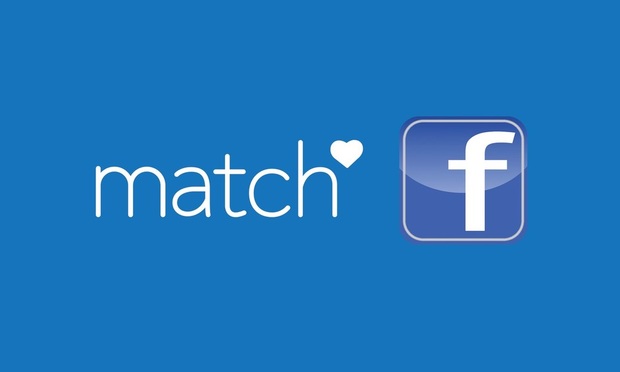Facebook Wants to Play Dating Game—Its Lawyers Could Face IP, Trade Secret Challenges
If legal fights in the online dating industry are any indication, Facebook's legal department would be smart to strategize about its inroads into this new line of business.
May 17, 2018 at 03:33 PM
6 minute read
 Unlimited RF
Unlimited RF Match Group, which owns Tinder, OKCupid, PlentyofFish and other prominent online dating sites, has been engaged in litigation on multiple fronts lately, showing that just because a company is in the business of helping users find love, doesn't mean its behavior toward competitors will be at all affectionate.
So, Match's newest rival in the online dating market, Facebook Inc., might want to have its in-house lawyers review Match's recent intellectual property lawsuits if the company wants to avoid the potential for litigation in its latest venture.
Two of Match's latest legal battles could hold lessons for Menlo Park, California-based Facebook's in-house lawyers, as the Dallas-based company pushes to aggressively defend its IP. Attorneys say there are messages for Facebook on both the IP infringement and trade secret fronts in the Match battles.
Match Vs.
Match filed two lawsuits back in March: one against its well-known U.S. competitor, Bumble Trading Inc., and another similar complaint against Chinese dating app TanTan.
Match alleged TanTan stole design patents and trademarks associated with its match screen, in addition to its “swipe,” “rewind” and “super like” functions. TanTan did not respond for comment on the allegations.
The TanTan suit came three days after Match filed a lawsuit against Bumble, claiming infringement of its utility patent, design patent, trademarks and trade dress. In its suit, Match refers to Bumble as a “Tinder copycat.”
A settlement has been reached with TanTan, and a federal judge formally dismissed the case Monday, according to a May 14 order from the U.S. District Court in Western Texas.
Bumble has yet to file a response in the lawsuit filed by Match in March, but it was quick to publicly react at the time. The company published a blog post saying it “swipes left” on Match and “we'll never be yours.” Bumble, which declined to comment for this article, is due to respond in the Match case in court by June 6.
Bumble then countered with a lawsuit of its own in March in a Texas state court, accusing Match of revealing Bumble's trade secrets after trying to acquire it, thereby poisoning Bumble's name in the market for other potential suitors.
Bumble claimed Match “deviously asked for, and received, Bumble's most sensitive competitive information—without disclosing that it was already planning to sue Bumble.” Bumble also claimed Match “made a series of false statements” by appearing to file its lawsuit as “an honorable attempt to protect its intellectual property rights.”
Challenges Ahead for Facebook
Match and its parent company, IAC, have already taken jabs at Facebook's decision to enter the market. Earlier this month, IAC chief executive Joey Levin said in a statement that Facebook's “product could be great for U.S./Russia relationships.”
Match declined to comment on any “hypotheticals” since Facebook's product has yet to launch.
The M&A issue seems unlikely to come into play for Facebook and Match, but the social network's attorneys still have much to glean from Match's lawsuits.
For one, when it comes to trade secrets, Facebook will need to be cautious when hiring any employees from Match to help develop its own platform, attorneys said.
Facebook, which did not respond for comment, has in fact hired at least 25 employees from popular dating sites in recent years, according to a search on LinkedIn.
While many of those employees moved to the company several years ago and their hire could be more by coincidence than by design, Facebook did recruit at least seven employees in 2017, including engineers, marketers and data scientists who previously worked for Match-owned businesses. Two of the 25 hires were from Bumble and Badoo Trading Ltd., which owns a majority stake in Bumble.
The small sample could shed little light into Facebook's workforce of nearly 28,000 employees worldwide but the data shows that the company is being strategic with some of its hires.
“If Facebook has hired or plans to hire senior employees from Match, it, like all employers, needs to be careful that those employees are not bringing over any proprietary information or trade secrets,” said Eric Ostroff, a partner at Meland Russin & Budwick.
Michael McCabe, an IP attorney with McCabe Law, said he “can pretty much guarantee that Facebook, and anyone else in this space, is studying carefully the progress of this litigation, including the patent that Match claims is being infringed by Bumble.”
“But of course,” McCabe added, “whenever a company of the size of Facebook rolls out any new product or application, you can bet that other patent holders will be chomping at the bit to allege that Facebook is infringing. That, unfortunately, is the cost of doing business—the more successful you are, the more you are likely to be targeted for allegedly violating someone else's IP.”
David Suter, a principal at Harness Dickey & Pierce, said he “cannot speak to the merits” of Match's position relative to Facebook or other competitors, but clearly “Match is willing and able to assert its IP, a fact that raises the risk profile in any assessment of its IP.”
Suter continued, “As a new and prominent entrant into this market, Facebook will need to look closely at Match's position, along with what I'd assume to be a large volume of other competitive IP. Facebook can be assured that Match will be looking closely at whatever it does, and needs to do its homework accordingly.”
As for the specifics of IP that Facebook should be considering, Facebook may want to watch how it “swipes.”
“Don't copy the functionality of swiping left and right,” said Jonathan Pearce, an attorney with SoCal IP Law Group, of the “somewhat basic” steps Facebook can take. “Avoid the use of the word and functionality of 'swipe' entirely if you want to avoid a suit,” he said. “Whether Match's claims are valid or not, Match will likely feel obligated to defend those 'swipe'-like rights it has asserted in the Bumble case.”
On the other hand, Pearce said, “Facebook will probably do whatever it thinks creates the best user experience and is likely to drive user engagement. They want eyeballs. They may simply view potential legal costs as a part of the cost of entering any new market, and budget accordingly.”
And maybe Match should be the company to watch its back. Pearce pointed out that while Match is large, Facebook is “huge.”
“Using the legal system to 'bully' Facebook is not something anyone can really do. I think, should Match or Facebook decide to fight, it would be a legitimate dispute on the merits of the case because both could afford it,” he said. “IP is one way to impede new entrants [to a market], but Facebook likely has sufficient funds and legal savvy at hand to enter any market it would like.”
This content has been archived. It is available through our partners, LexisNexis® and Bloomberg Law.
To view this content, please continue to their sites.
Not a Lexis Subscriber?
Subscribe Now
Not a Bloomberg Law Subscriber?
Subscribe Now
NOT FOR REPRINT
© 2025 ALM Global, LLC, All Rights Reserved. Request academic re-use from www.copyright.com. All other uses, submit a request to [email protected]. For more information visit Asset & Logo Licensing.
You Might Like
View All
Trump Fires EEOC Commissioners, Kneecapping Democrat-Controlled Civil Rights Agency

Spotify GC Steps Down, Opts to 'Step Away From Full-Time Corporate Life'
2 minute read
Trending Stories
Who Got The Work
J. Brugh Lower of Gibbons has entered an appearance for industrial equipment supplier Devco Corporation in a pending trademark infringement lawsuit. The suit, accusing the defendant of selling knock-off Graco products, was filed Dec. 18 in New Jersey District Court by Rivkin Radler on behalf of Graco Inc. and Graco Minnesota. The case, assigned to U.S. District Judge Zahid N. Quraishi, is 3:24-cv-11294, Graco Inc. et al v. Devco Corporation.
Who Got The Work
Rebecca Maller-Stein and Kent A. Yalowitz of Arnold & Porter Kaye Scholer have entered their appearances for Hanaco Venture Capital and its executives, Lior Prosor and David Frankel, in a pending securities lawsuit. The action, filed on Dec. 24 in New York Southern District Court by Zell, Aron & Co. on behalf of Goldeneye Advisors, accuses the defendants of negligently and fraudulently managing the plaintiff's $1 million investment. The case, assigned to U.S. District Judge Vernon S. Broderick, is 1:24-cv-09918, Goldeneye Advisors, LLC v. Hanaco Venture Capital, Ltd. et al.
Who Got The Work
Attorneys from A&O Shearman has stepped in as defense counsel for Toronto-Dominion Bank and other defendants in a pending securities class action. The suit, filed Dec. 11 in New York Southern District Court by Bleichmar Fonti & Auld, accuses the defendants of concealing the bank's 'pervasive' deficiencies in regards to its compliance with the Bank Secrecy Act and the quality of its anti-money laundering controls. The case, assigned to U.S. District Judge Arun Subramanian, is 1:24-cv-09445, Gonzalez v. The Toronto-Dominion Bank et al.
Who Got The Work
Crown Castle International, a Pennsylvania company providing shared communications infrastructure, has turned to Luke D. Wolf of Gordon Rees Scully Mansukhani to fend off a pending breach-of-contract lawsuit. The court action, filed Nov. 25 in Michigan Eastern District Court by Hooper Hathaway PC on behalf of The Town Residences LLC, accuses Crown Castle of failing to transfer approximately $30,000 in utility payments from T-Mobile in breach of a roof-top lease and assignment agreement. The case, assigned to U.S. District Judge Susan K. Declercq, is 2:24-cv-13131, The Town Residences LLC v. T-Mobile US, Inc. et al.
Who Got The Work
Wilfred P. Coronato and Daniel M. Schwartz of McCarter & English have stepped in as defense counsel to Electrolux Home Products Inc. in a pending product liability lawsuit. The court action, filed Nov. 26 in New York Eastern District Court by Poulos Lopiccolo PC and Nagel Rice LLP on behalf of David Stern, alleges that the defendant's refrigerators’ drawers and shelving repeatedly break and fall apart within months after purchase. The case, assigned to U.S. District Judge Joan M. Azrack, is 2:24-cv-08204, Stern v. Electrolux Home Products, Inc.
Featured Firms
Law Offices of Gary Martin Hays & Associates, P.C.
(470) 294-1674
Law Offices of Mark E. Salomone
(857) 444-6468
Smith & Hassler
(713) 739-1250







